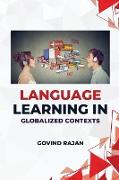Language Learning in Globalized Contexts
BücherAngebote / Angebote:
Language learning in globalized contexts is a multifaceted and dynamic process that involves acquiring and using languages in an interconnected world. In today's globalized society, where communication and interactions occur across borders and cultures, the ability to learn and communicate in multiple languages has become increasingly crucial. One aspect of language learning in globalized contexts is the recognition of the diverse linguistic landscape. As individuals engage with people from different cultural and linguistic backgrounds, they are exposed to a wide range of languages and dialects. This exposure offers opportunities to develop linguistic competence, intercultural understanding, and cross-cultural communication skills. Moreover, it fosters an appreciation for linguistic diversity and encourages the preservation of endangered languages. Another key aspect is the role of technology in language learning. With the advancement of digital tools and online platforms, language learners can access an array of resources, connect with native speakers, and participate in virtual language communities. Technology facilitates language learning by providing interactive language courses, language exchange platforms, and multimedia resources that enhance listening, speaking, reading, and writing skills. Additionally, it enables learners to overcome geographical barriers and engage in immersive language experiences, such as virtual reality simulations and online language immersion programs. In globalized contexts, language learning is not solely limited to the classroom setting. Informal learning environments, such as travel, work, and social interactions, also play a significant role. Immersion in a target language environment allows learners to practice their language skills in real-life situations, gain cultural insights, and develop intercultural competence. These experiences provide learners with authentic language input and promote communicative competence by encouraging adaptability, tolerance, and empathy. Furthermore, language learning in globalized contexts is closely linked to professional and economic opportunities. Proficiency in multiple languages enhances employability, expands career prospects, and fosters international collaboration. In today's interconnected world, businesses, organizations, and institutions value individuals who can effectively communicate across languages and cultures, as it facilitates intercultural negotiations, improves customer service, and enables global teamwork. In conclusion, language learning in globalized contexts encompasses the recognition of linguistic diversity, the integration of technology, the importance of informal learning environments, and the connection to professional opportunities. Embracing language learning in a globalized world promotes intercultural understanding, fosters effective communication, and empowers individuals to navigate the complexities of our interconnected society.
Folgt in ca. 10 Arbeitstagen




